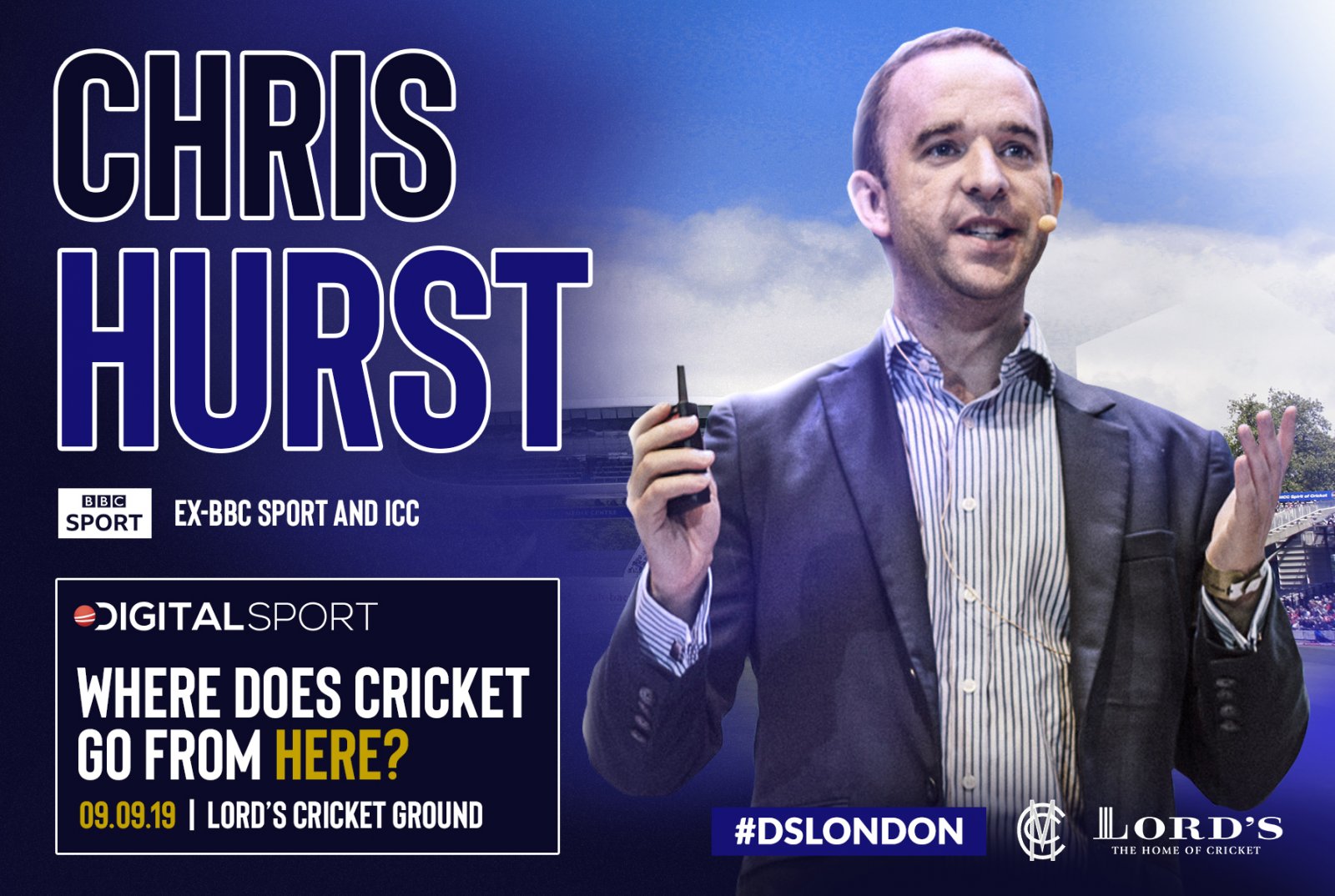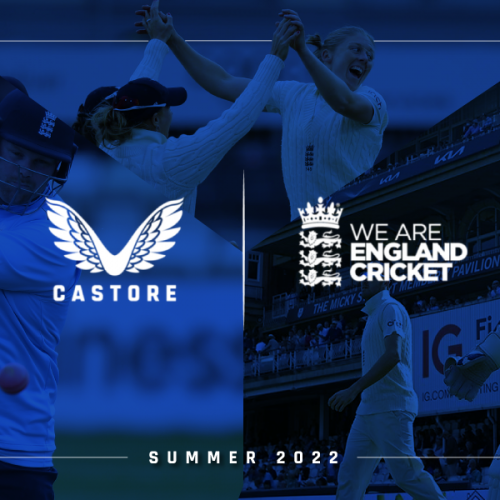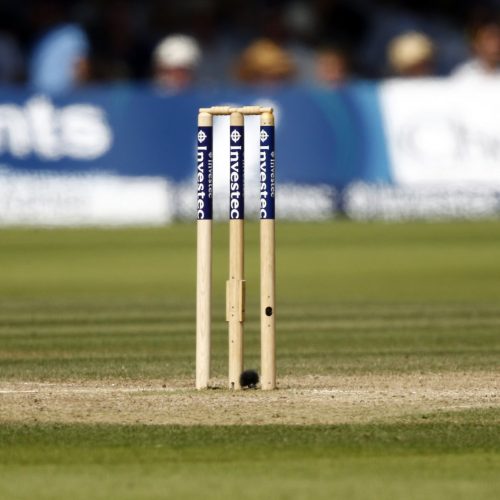Where does cricket go from here? Meet our moderator: Chris Hurst
Our event, ‘Where Does Cricket Go From Here?’ looks to explore in more depth how the growth of the game will be impacted from the summer we’ve had, getting the very best insight from experts in their fields.
Profile
Chris began his career at the Premier League in 2002 in their press and public affairs team, before joining the International Cricket Council as Corporate Communications Manager in 2006. Chris then spent seven years in Dubai, overseeing the ICC’s digital and social media channels, delivering the ICC’s publications, and managing the organisation’s corporate social responsibility partnerships.
He returned to the UK in 2013 and as BBC Sport’s first dedicated social media editor, he developed and delivered a strategy focused on growing BBC’s social media reach, engaging younger audiences and supporting live event coverage. In 2015 he also became Digital Development lead for BBC Sport’s award-winning interactive services, where Chris oversaw the editorial development plans for events including the Rio Olympics, which attracted 102 million unique browsers during the Games.
In November 2016, he became the digital lead in Europe for Nielsen Sports, a leading measurement and insight company for sports rights holders and brands, before setting up his own digital sports consultancy in the autumn of 2018.
He also sits on the board of the Rugby Football League and the Women’s Sport Trust.
Tell us a bit about yourself, Chris…
“I have been very fortunate in my career to be able to combine my passions for sport, digital media and travel, while working for some of the biggest sports organisations in the world, across rights holders, broadcasters and research agencies.
“I am a huge fan of a range of sports and cricket has taken me all over the world and provided me with some incredible life experiences, both for work and as a fan. Highlights have included being there for England’s men and women winning 50-over World Cup events (2019 and 2009) and 20-over World titles (2010 and 2007 respectively) and watching England’s men win Test matches in far flung places such as Dhaka, Kolkata, Melbourne, Mumbai and Sydney.”
Briefly tell the audience a bit about your work and how you got to be where you are?
“I have been lucky enough to work in a range of corporate communications and digital sport jobs throughout my career at leading sports organisations including The Premier League, International Cricket Council, BBC Sport and Nielsen Sports.
“I then set up my own digital sports consultancy last year, working with a range of broadcast, rights holder and brand clients, and I also sit on the board of the Rugby Football League and the Women’s Sport Trust.
“Some of the highlights in my time in cricket including overseeing the ICC’s live digital event coverage for tournaments including the ICC Cricket World Cup, setting the ICC up on social media and beginning the growth of the accounts that they have become today. Also, seeing how the power of sport can contribute to delivering social change through partnerships with organisations like UNICEF and UNAIDS, having the chance to be involved in working with the Test Match Special team, and also playing a role in enhancing BBC Sport’s digital cricket coverage.”
What was your take on the Cricket World Cup?
“I am not sure that a tournament will ever have a better finale than the Cricket World Cup final at Lord’s. It was probably the most exciting sporting event that I have ever attended in person and my wife, who was 37 weeks pregnant, and I credit the drama of being at the Super Over in resulting in the early arrival of our first son a few days later!
“There was much industry debate on how much cut-through the tournament had in the UK, aside from the final, but if you look at the attendance levels for across the event, occupancy rates were like nothing that had been seen for any previous Cricket World Cup before.
“From a digital perspective, I think that the International Cricket Council did an excellent job in ensuring that the content from the event went on a wide range of social media platforms, and the investment into reaching fans via digital platforms has grown significantly in the past few years.
“I also think that the way in which sponsors were integrated across the world broadcast feed, in combination with branded content digital partnerships, is a model that many other sports will look to replicate in the future.
“I was also impressed with the range of digital innovation, from launching a lite version of the App and the delivery of content on new platforms such as TikTok.
“Finally, from a technical perspective, the ability of Hotstar, one of the ICC’s broadcast partners, to deliver the ICC Cricket World Cup semi-final between India and New Zealand to an audience of 25.3 million concurrent viewers is incredible, and has set the global standard for delivering live coverage of a sporting event at scale.”
Where does Cricket go from here? How can it grow after such a big summer?
“I think cricket has a really exciting opportunity to continue the grow the game in the UK from a strong position.
“At a grass-roots level, it has been great to see lots of children in the area where I live, playing the game in local parks, hopefully inspired by the success of two World Cup wins on home soil in the past two years.
“I also really like the sentiment behind some of the top-line objectives of the ECB strategic plan for 2020-24, with a real focus on reach and engagement, to increase the number of people who say ‘cricket is a game for me’, who have an enhanced perception of cricket and to increase the game’s engagement with younger audiences, women and girls.
“To do this, cricket is going to have to do things differently to how they have been delivered before, and digital can be at the heart of that. While the ECB has done a good job in reaching avid fans through its digital channels, growing global audience engagement numbers, I think there are opportunities to deliver cricket in a different way to excite new audiences, especially in the UK, which is also where competitions like The Hundred can play a vital role. While the big moments on the field of play, like Ben Stokes’ incredible performance in the last Test Match, will always cut-through to more general sports fans, I always admire the sports that manage to create digital moments away from the action that achieve reach and engagement amongst different targeted audiences.
“Reflecting on my time as BBC Sport’s digital development and social media lead during the Rio Olympics in 2016, where we reached 102 million unique global browsers, we had to make some very conscious decisions to commission content and user journeys not just to appeal to avid sports fans – as there is only a limited number of such fans – but those who wouldn’t normally engage with the BBC Sport website, and think about the ways in which you would get that content to audience, be it through other parts of the BBC, search, social and syndication.
“For example, some of the Olympics content created was in a style/tone to reach BBC home page audiences, not BBC Sport home page users, or to meet the broader interest of a news audience, especially when you could cross promote content via the huge reach of BBC News’ social channels and bring audiences back to the BBC website.
“From an English cricket perspective, the regular return of cricket to free-to-air television next year on the BBC is also incredibly exciting, particularly when the organisation throws its cross-platform promotional resource behind its offer, as seen during the FIFA Women’s World Cup, which resulted in incredible audience engagement.
“And as a county cricket fan, despite the progress that has been made to enhance the digital offer for supporters, I would still, rights permitting, like it be easier to follow the matches. In my role with the RFL, I love how the ‘Our League’ App has created an OTT offer for fans to follow high quality coverage of matches that previously weren’t available for broadcast, such as the Championship, Women’s Super League and even school’s competitions.”
What major problems does it face in building on these past few months?
“The biggest challenge for all sports at the moment in my view is the competition for the consumer’s time. That doesn’t just come from competition from other cricket events or sports, but also from other distractions. When you could spend six hours watching a Netflix series or gaming, the battle to get somebody to engage in five consecutive days of Test cricket, unless you are an avid fan, is a tough one, which is why short-form clips are important alongside brilliant television broadcast coverage.
“I also loved the atmosphere of being at World Cup matches where fans of the South Asian teams helped make it an amazing occasion, but sadly you don’t see those fans in English cricket grounds on a regular basis in such large numbers. This is why the South Asian Action plan that the ECB launched can potentially have a transformative effect on the sport, and again the opportunities digital creates for that are vital in delivering an enhanced personalised service.
“When you tell people that you love the sport you sometimes hear people say the game is ‘boring’, so the game does have a perception challenge to overcome. However, in my experience when you actually take such people to a game, especially a shorter-form game, or you get them to watch an amazing piece of skill, such as Ben Stokes’ catch in the opening game of the World Cup, they really appreciate what an exciting and sociable sport it can be.
“Like many other governing bodies, I also think there is still an opportunity to use data more effectively to understand audience behaviour, but it is not always easy to do that. As a cricket fan, you could, for example, be a regular participant through a league like Last Man Stands, a ticket buyer for one test match, a spectator at a range of T20 games when you didn’t purchase the ticket yourself, a Sky subscriber purely because of their cricket coverage, a BBC Sport website user who loves their live text service and TMS, a regular consumer of ECB’s social media content, and have your own children playing in a local club programme, but it is hard to connect all of those data points together.”
Are you fancying England to win the Ashes and complete the perfect summer?
“The first three Test matches of the Ashes series have certainly provided plenty of excitement so far – it is hard to think of a Test match more dramatic than Headingley – and it would be great to go into the final match of the Oval with the series still all to play for and with both sides in with a chance of winning the series. Hopefully Steve Smith will recover from his concussion and fans will get to enjoy one of the greatest players taking on England’s attack, as well as having the chance to watch Jimmy Anderson play a part in the series again. It is brilliant for the sport that it has been able to create moments that get the nation talking about the sport and engaging people beyond its traditional audience.
“In the women’s game, it was disappointing that the England women’s team couldn’t be more competitive against Australia earlier in the summer in their Ashes contest and that the series didn’t get the exposure and audience that it merits. Having achieved 28,000 fans attending the Women’s World Cup final in 2017, I would like to see more being done to attract large crowds to women’s matches at both a domestic and international level, to maintain the momentum of that incredible achievement. I sit on the board of the Women’s Sport Trust, a UK sports charity that encourages greater media coverage and brand investment into women’s sport, and I love the ambition of the Women’s Twenty20 World Cup to try and attract 100,000 to the final on International Women’s Day in Melbourne next year.”
About author
You might also like
SPORTEL 2021: Day One Recap
This year’s prestigious SPORTEL convention kicked off in sunny Monaco today, welcoming a host of familiar faces as well as plenty of new ones. Doors opened at 8:30am with businesses
Castore confirmed as Official Kit Supplier to England Cricket
Castore to be Official Kit Supplier to England Cricket The long-term partnership begins in April 2022 All of England’s national teams will wear bespoke women’s and men’s teamwear that the
The Hundred “a game changer” for women’s cricket.
The Hundred attracts more live viewers than the Netball World Cup, Women’s T20 World Cup and Women’s Six Nations. 7.05m viewers tuned in to watch women’s matches live throughout the
© 2015 Copyright @DigitalSportUK. All Rights reserved.









